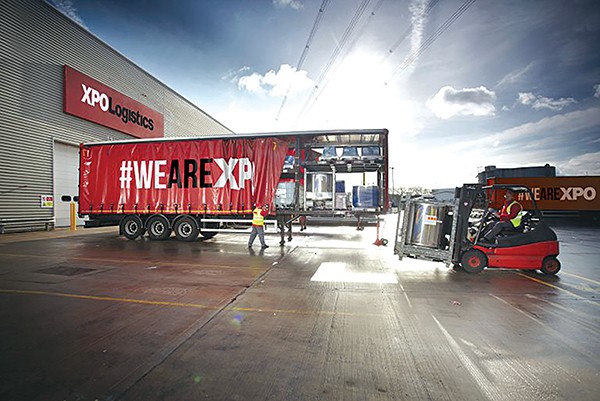A recent New York Times article shed light on the discrimination and abuse being carried out against women workers in a Memphis warehouse. At one of XPO Logistics’ warehouses here, there have been reports of “chronic pregnancy discrimination” leading to several miscarriages, the article revealed.
This is the same company’s warehouse where multiple complaints of sexual harassment and poor working conditions in extreme heat have been filed, as I reported in the Flyer earlier this month.
Workers said that working long hours in the non-air-conditioned warehouse led to dehydration, dizziness, and even fainting. On one occasion, an employee experienced cardiac arrest and, as a result, died on the job. Facebook posts at the time suggested the supervisor did not allow CPR to be administered and then insisted that the other employees continue working as their coworker’s lifeless body lay at their feet.

XPO Logistics
So, continuing with the company’s tendency to value the bottom line over the health, safety, and sanity of its employees, the Times reported on how pregnant women are worked beyond their physical abilities, endangering their health and the health of their babies.
Refusing to lighten the workload for expecting mothers, XPO Logistics has been requiring them to stand on their feet, lift heavy boxes, and work 12-hour shifts with what appears to be no permission for relief from management. One worker cited in the article, who suffered from a miscarriage while on the job, said she asked her supervisor to relieve her from lifting large boxes several times, but he refused each time. She subsequently fainted one day while at work and lost her unborn baby.
Even with doctors’ notes recommending lighter workloads and shorter shifts, the supervisors ignored the potential dangers to the expecting mothers and their babies, making them push through with required manual labor. That’s inhumane and irresponsible. It should be illegal.
I’m really confused as to how this company is able to get away with what seems like clear human rights violations in its warehouse operation. According to A Better Balance (ABB) — a national legal nonprofit fighting to give American workers the time and flexibility they need to care for themselves and their families without risking their economic security — discrimination against pregnant women in the workplace is not uncommon in the United States, especially in low-wage jobs.
However, ABB said there are various local, state, and federal laws that are meant to protect expecting mothers, as well as to give certain workers who experience or are at risk of miscarriage the right to time off to receive reasonable accommodations following a miscarriage, and to be free from discrimination by their employers because they have miscarried.
Under the Pregnancy Discrimination Act, which was passed 40 years ago this month, if an employee is temporarily unable to perform her job due to pregnancy, “the employer must treat her the same as any other temporarily disabled employee; for example, by providing light duty, modified tasks, alternative assignments, disability leave, or leave without pay.”
Despite the law, nearly 31,000 pregnancy discrimination charges were filed with the U.S. Equal Employment Opportunity Commission and other state-level fair employment practice agencies between October 2010 and September 2015, the National Partnership for Women and Families found. Twenty-three states, Washington D.C., and four cities have laws in place providing a further level of protection and reasonable accommodation for pregnant employees. Tennessee nor Memphis is in that group.
Still, with the various laws in place, women are being removed from jobs, overlooked for promotions, and denied accommodations for the simple fact that they’re pregnant.
That’s why Congress needs to pass the Pregnant Workers Fairness Act, a bill that would prevent employers from forcing pregnant women from their jobs, and mandates that they receive the proper amount of accomodation for their condition. It would also require an interactive process between employers and pregnant workers to determine the appropriate accommodations, similar to under the Americans with Disabilities Act. Finally, the law would protect pregnant workers from retaliation, coercion, intimidation, threats, or interference if they request or use an accommodation.
It should really go without saying that expecting mothers and their unborn children should be protected in the workplace, but we live in a country where discrimination is commonplace and laws are still needed to protect the basic rights of working people.
Maya Smith is a Memphis Flyer staff writer.